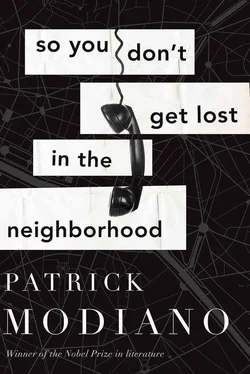He sat down on a garden bench, in the sunshine, near the arcades of the Galerie de Beaujolais. He must have walked for over an hour without even noticing that it was hotter still than on the other days. Torstel. Perrin de Lara. But yes, he had met Perrin de Lara one final time, in the same year as that Sunday at Le Tremblay — he was barely twenty-one — and this meeting would have vanished into la nuit froide de l’oubli —as the song goes — had it not been to do with Annie Astrand. One evening, he happened to be in a café on the Rond-Point des Champs-Élysées, one that had been converted into a “Drugstore” in the years that followed. It was ten o’clock. A pause before continuing his walk to square du Graisivaudan, or rather to a room in rue Coustou that he had been renting for some time at six hundred francs a month.
He had not immediately noticed the presence, that night, of Perrin de Lara, in front of him, sitting on the terrace. Alone.
Why had he spoken to him? He had not seen him for over ten years, and this man would certainly not recognise him. But he was writing his first book, and Annie Astrand was filling his mind in an obsessive way. Perhaps Perrin de Lara knew something about her?
He had stood in front of his table, and the man had looked up. No, he did not recognise him.
“Jean Daragane.”
“Ah. . Jean. .”
He smiled at him, a faint smile, as though he were embarrassed that someone should recognise him at that time of night, on his own, in such a place.
“You’ve grown taller over the years. . Sit down, Jean. .”
He pointed to the chair, opposite him. Daragane hesitated for a fraction of a second. The glazed terrace door was ajar. All he had to do was say what he normally said: “Wait. . I’ll be back. .” Then go out into the open air of the night, and take a deep breath. And, most importantly, avoid any further contact with a shadow, who would be waiting over there, alone, on a café terrace, for all eternity.
He sat down. Perrin de Lara’s Roman-statue face had become bloated and his hair had acquired a greyish tinge. He was wearing a navy-blue linen jacket that was too flimsy for the season. In front of him, a half-drunk glass of Martini, which Daragane recognised by its colour.
“And your mother? It’s years since I’ve been in touch with her. . You know. . we were like brother and sister. .”
He shrugged, and there was an anxious expression in his eyes.
“I’ve been away from Paris for a long time. .”
It was clear that he would have liked to tell him about the reasons for this long absence. But he remained silent.
“And have you seen your friends Torstel and Bob Bugnand again?”
Perrin de Lara seemed surprised to hear these two names coming from Daragane’s lips. Surprised, and suspicious.
“What a memory you have. . do you remember those two?. .”
He stared at Daragane, whose gaze made him feel uncomfortable.
“No. . I don’t see them anymore. . It’s incredible what good memories children have. . And you, what’s new?”
Daragane could sense a note of bitterness in this question. But perhaps he was mistaken, or else in Perrin de Lara’s case was it simply the effect of a Martini drunk on his own, at ten o’clock at night, in autumn, on the terrace of a café?
“I’m trying to write a book. .”
He wondered why he had admitted this.
“Ah. . like the time when you were jealous of Minou Drouet?”
Daragane had forgotten this name. But yes, this was the little girl of his own age who had once published the anthology of poems, Arbre, mon ami .
“Literature’s a very difficult thing. . I suppose you must have realised this already. .”
Perrin de Lara’s voice had taken on a moralising tone that surprised Daragane. The little he knew of him and the childhood memory he retained of him would have led him to think that this man was rather frivolous. The sort of person who perches his elbow on marble fireplaces. Had he, like his mother and Torstel, and possibly Bob Bugnand too, belonged to the “Chrysalis Club”?
He eventually said to him:
“So, after all this time away, you’ve come back to Paris for good?”
The man shrugged and looked at Daragane with a haughty expression, as though the latter had lacked respect.
“I don’t know what you mean by ‘for good’.”
Daragane did not know either. He had simply said that for the sake of conversation. And the man was very touchy. . He felt like standing up and saying to him: “Well, good luck, monsieur. .” and, before going through the glazed terrace door, he would smile and wave to him, as though on a railway station platform. He restrained himself. Patience was required. He may know something about Annie Astrand.
“You used to give me advice about reading. . Do you remember?”
He did his best to speak with emotion. And it was true, after all, that when he was a child this shadowy figure had given him La Fontaine’s Fables in the Classiques Hachette collection with their pale green covers. And some time later, the same man had recommended that he read Fabrizio Lupo when he was older.
“You really do have a good memory. .”
His tone had softened, and Perrin de Lara was smiling at him. But the smile was slightly strained. He leant over towards Daragane:
“I have to tell you. . I no longer recognise the Paris in which I lived. . Five years away were enough. . I feel as though I’m in a foreign city. .”
He clenched his jaws as if to prevent the words tumbling from his lips in a confused stream. He had probably not spoken to anyone for a long time.
“People no longer reply to telephone calls. . I don’t know whether they’re still alive, whether they’ve forgotten me, or whether they don’t have time anymore to take a call. .”
His grin had grown broader, his expression gentler. Perhaps he meant to cushion the sadness of his words, a sadness that was in keeping with the deserted terrace where the lighting created pools of dim light.
He seemed to regret having confided these matters. He sat up straight and looked over towards the glazed terrace door. In spite of the coarsening of his face and the grey curls that now made his hair look like a wig, he retained that statuesque stillness that he often displayed ten years ago, one of the rare images of Jacques Perrin de Lara that Daragane remembered. And he also had the habit of frequently turning his head in profile when speaking to people, as he did at this moment. He must have once been told that he had a rather fine profile, but all those who had told him so were dead.
“Do you live in the neighbourhood?” Daragane asked him. Once again, he leant over towards him and was hesitant in his reply.
“Not very far away. . in a small hotel in the Ternes district
“You must give me the address. .”
“Would you really like me to?”
“Yes. . I’d be happy to see you again.”
He was now going to get to the heart of the matter. And he felt some apprehension. He cleared his throat.
“I’d like to ask you for some information. .”
His voice was hollow. He noticed the surprise on Perrin de Lara’s face.
“It’s to do with somebody you may have known. . Annie Astrand. .”
He had spoken this name quite loudly and articulated the syllables carefully, as you do on the telephone when interference is likely to muffle your voice.
“Tell me the name again. .”
“ANNIE ASTRAND.”
He had almost yelled it out and he felt as though he had been sending out a call for help.
“I lived at her home for a long time in a house at Saint-Leu-la-Forêt. .”
The words he had just uttered were very clear and sounded metallic in the silence of this terrace, but he thought they made no difference.
Читать дальше












